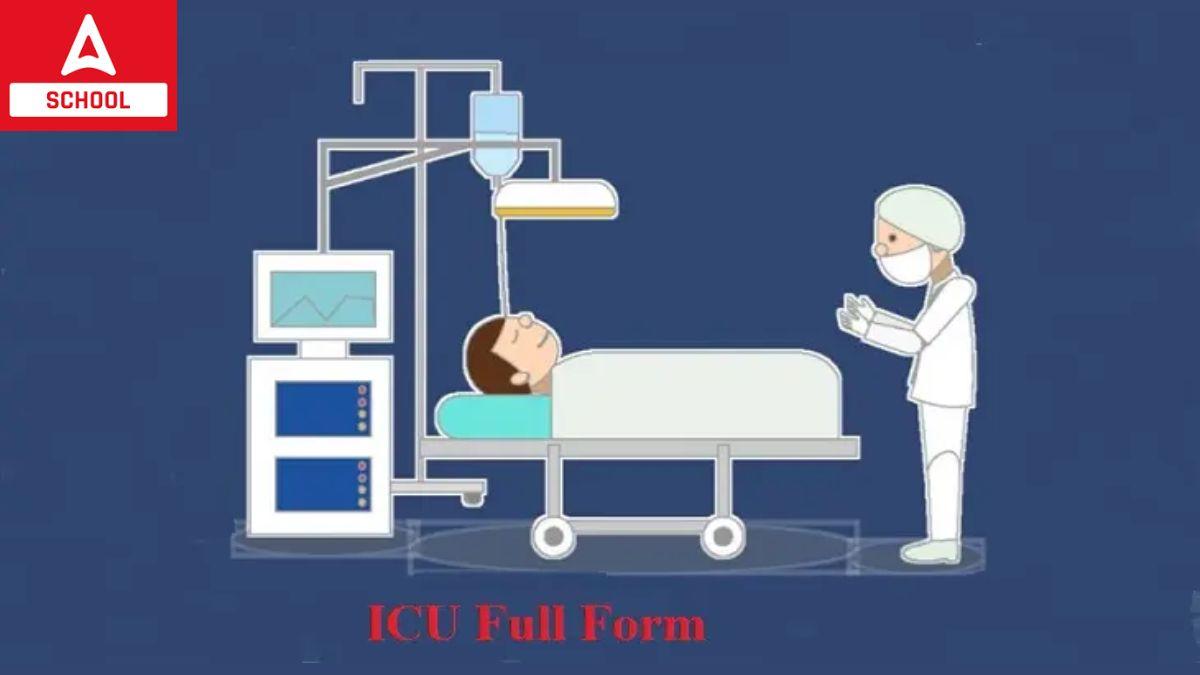Table of Contents
You must have heard and seen about the ICU in movies and serials. If you have a slight idea about this, then you can relate that this term is related to the medical field. ICU is a life saving division of a hospital that deals with highly critical cases. In this article, we will educate you about ICU by going through its full form and other related details.
ICU Full Form
ICU stands for intensive care unit. An intensive care unit (ICU) is also known as an intensive therapy unit (ITU) or a critical care unit (CCU) (CCU). An intensive care unit (ICU) is a hospital or healthcare facility’s specialized department. Intensive care medicine is provided via an intensive care unit.
Patients in intensive care units have serious or life-threatening illnesses or injuries. ICU is for anyone who requires round-the-clock care, close monitoring via life support equipment, and medication to maintain normal bodily functioning. A highly skilled team of physicians, nurses, and respiratory therapists work in an intensive care unit.
What is the Full Form of ICU
In the healthcare field, the term ICU is well-known and commonly used, however, its full name, Intensive Care Unit, represents more than just a title. The ICU, an essential part of contemporary hospitals, is focused on offering specialized treatment for patients with serious or life-threatening illnesses. These critically ill patients are cared for by a team of highly skilled physicians, nurses, and respiratory therapists.
In comparison to ordinary wards, ICUs feature a larger staff-to-patient ratio and access to advanced medical resources and equipment that are not routinely available elsewhere. If a patient’s condition rapidly deteriorates, they may be referred directly from an emergency department or a ward. Patients may be referred following surgery if the procedure is extremely invasive and the patient is at significant risk of complications.
ICU Full Form in Medical
The ICU full form in medical is Intensive Care Unit. In hospitals, it is also known by the name, Critical Care Unit. The concept of ICU can be attributed somewhat to Florence Nightingale. Florence Nightingale left for the Crimean War in 1854, where she used triage. Triage was employed to separate badly injured soldiers from others who were not in danger of dying. When acute care cannot be provided due to a lack of resources, the practice of triage is used.
The system prioritises care for those who require it most urgently. It refers to the prioritization of medical care for a person who will benefit the most from the treatment. It is most commonly used on the battlefield or in times of peace when a mass casualty occurs due to an accident.
Furthermore, it was recently claimed in a report, that Nightingale cut combat mortality from 40% to 2%. Although this is only partially true and was not the case, her wartime experiences laid the groundwork for her eventual recognition of the necessity of hygienic conditions in hospitals. A major component of intensive care is the need for hygienic conditions in hospitals.
ICU Full Form: History
Anesthesiologists developed the idea of advanced life support in 1950. In an intensive care setting, it kept patients sedated and ventilated. It is regarded as one of the earliest forms of critical care medicine. Many patients required ongoing ventilation and surveillance during the polio pandemic. Bjrn Aage Ibsen established the first intensive care facility in Copenhagen in response to the polio pandemic.
In 1953, Copenhagen’s first intensive care facility was established. Furthermore, this concept was initially implemented in the United States in 1955. William Mosenthal was the first to put this concept into practice. William Mosenthal was a Dartmouth-Hitchcock Medical Center surgeon.
The importance of cardiac arrhythmias as a cause of morbidity and death in heart attacks was recognized in the 1960s, which led to the widespread use of cardiac monitoring in intensive care units.
Medical Tools Used ICU Division
An intensive care unit contains a variety of medical tools, some of which are outlined below.
- Mechanical ventilators
- Suction tubes
- Feeding tubes
- Anesthesia Machine
- External pacemakers
- Blood Warmer
- Dialysis machine
- Infusion Pump
- Patient Monitor
- Electrocardiogram(ECG)
- Syringe Pump
- Defibrillator and so on.
Injuries that Need ICU Treatment
As you now know the ICU full form, you should also know the diseases and injuries that requires treatment in the ICU. ICU staff typically include respiratory therapists, physical therapists, pharmacists, anaesthesia specialists, and others.
- Serious heart issues like heart attack and very low blood pressure can lead to severe complications.
- Complications involving the respiratory system related to asthma or severe pneumonia.
- Unexpected situations that necessitate significant surgery and immediate action.
- Patients in a comatose state require care in the intensive care unit.
- Complications involving the liver and instances of kidney failure necessitating dialysis.
- Following a significant surgery, a patient requires care in the intensive care unit (ICU).
- Babies who are premature or have serious medical conditions have access to a designated intensive care unit called NICU (neonatal intensive care unit).
| Related Articles | |
| OTT Full Form | MLA Full Form |
| OTG Full Form | LOC Full Form |



 CGPA Full Form, Meaning in Hindi, Kannad...
CGPA Full Form, Meaning in Hindi, Kannad...
 FIR Full Form, Check What is the Full Fo...
FIR Full Form, Check What is the Full Fo...
 TGT Full Form, Check What is the Full Fo...
TGT Full Form, Check What is the Full Fo...










